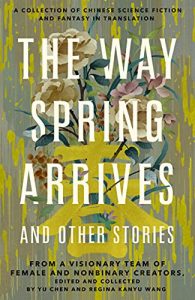Caren Gussoff Sumption Reviews The Way Spring Arrives and Other Stories by Yu Chen & Regina Kanyu Wang, eds
 The Way Spring Arrives and Other Stories, Yu Chen & Regina Kanyu Wang, eds. (Tordotcom 978-1-25076-891-9, $26.99, 400pp, hc) March 2022.
The Way Spring Arrives and Other Stories, Yu Chen & Regina Kanyu Wang, eds. (Tordotcom 978-1-25076-891-9, $26.99, 400pp, hc) March 2022.
By now, many of us are already preparing for the 81st World Science Fiction Convention next year in China. So it’s the perfect time for an anthology like The Way Spring Arrives and Other Stories to hit shelves and tide us over until 2023.
Though Chinese publishers have been actively translating and publishing Western speculative fiction for decades, the brilliant work coming out of China has only recently begun to claim its rightful place with major English language publishers and among fans. The Way Spring Arrives and Other Stories treats us to a lot of stories (alongside five essays, all of which add depth and context to the history and state of speculative fiction in China), and a real delight is that all 17 are written, translated, and curated by female-identified and nonbinary writers and editors. For those of us who may not fully grasp the significance of this, the essay by Yale professor Jing Tsu on ‘‘The Futures of Genders in Chinese Science Fiction’’ is worth reading first, before diving into any of the stories.
There is no simple way to characterize the range of work presented here, except to say the prose, uniformly, is elegant, with a lyrical sense that is testament to the work of the writers and translators. It’s not an anthology easily read in one sitting; it’s a big, rich meal, and you have to savor it. I tried to read a few stories in a row, and even being a voracious reader – I couldn’t do it without feeling overwhelmed.
Honestly, there isn’t a honker in the bunch, either. There are stories I felt to be standouts – which I’ll mention – but every story was strong. Even the ones I liked less I still greatly enjoyed for one reason or another, above and beyond the luscious language; for example, while ‘‘The Restaurant at the End of the Universe: Tai-Chi Mashed Taro’’ by Anna Wu, translated by Carmen Yiling Yan was not among my favorites, it was a marvelous conversation with the eponymous Douglas Adams piece, with nods to Adams’s style and dry wit.
The standout of standouts for me was a short, ‘‘What Does the Fox Say?’’ Among the diverse pieces, this one was singular – not just in length, but in that the piece itself was a conceptual exercise in thinking about language, translation, and where/how artificial intelligence intersects with these human constructs. It’s a rare conceptual piece that is successful as an experiment and a readable, enjoyable story, and this one manages both. It was written in English by Xia Jia, who has published in Chinese and English (also under the name Wang Yao). I’m aware that a good portion of its appeal to me is more writerly than readerly; the crafting, circular structure, and economy of language are marvels, examining the story for craft. But it’s also a fun read, and a fresh perspective on how language works.
The opening story, ‘‘The Stars We Raised’’ by Xiu Xinyu, translated by Judy Yi Zhou, stayed with me for a good while after reading it. Very little of the strange phenomenon in the piece, which includes our world suddenly populated by tiny, harmless ‘‘stars’’ (which are played with by children and eventually transformed into a profitable industrial raw material), is explained. Its world-building is matter-of-fact, a backdrop against which unfolds a very tender, understated Bildungsroman. It’s sad and sweet, with an ambiguous ending that still manages to satisfy.
A third standout is ‘‘Baby, I Love You’’ by Zhao Haihong, translated by Elizabeth Hanlon. It’s one of the most narratively straightforward tales in the volume, in which a developer is persuaded to have a child in real life, in order to assist him in creating a more realistic holographic game simulating child-rearing. Of course, the situation is more complicated than expected, because real children – and real families – are messy, and ultimately irreplaceable by any game, no matter how well designed. The story, however, delves deeper into the complex issues around whether one wants to have children or not, whether someone should concentrate on career over family, how someone finds meaning, and the emotional costs of these kinds of life decisions. It’s a lovely exploration of these questions, with an additional layer viewed through the lens of a culture that, from 1980 to 2016, put strict legal limits on population growth and families having more than one child.
Overall, The Way Spring Arrives is both an important and enjoyable anthology, giving a cohort of wildly talented writers a wider audience. Recommended without reservation.
Caren Gussoff Sumption is a writer, editor, Tarot reader, and reseller living outside Seattle, WA with her husband, the artist and data scientist, Chris Sumption, and their ridiculously spoiled cat-children.
Born in New York, she attended the University of Colorado, the School of the Art Institute of Chicago, Clarion West (as the Carl Brandon Society’s Octavia Butler scholar) and the Launchpad Astronomy Workshop. Caren is also a Hedgebrook alum (2010, 2016). She started writing fiction and teaching professionally in 2000, with the publication of her first novel, Homecoming.
Caren is a big, fat feminist killjoy of Jewish and Romany heritages. She loves serial commas, quadruple espressos, knitting, the new golden age of television, and over-analyzing things. Her turn offs include ear infections, black mold, and raisins in oatmeal cookies.
This review and more like it in the April 2022 issue of Locus.
 While you are here, please take a moment to support Locus with a one-time or recurring donation. We rely on reader donations to keep the magazine and site going, and would like to keep the site paywall free, but WE NEED YOUR FINANCIAL SUPPORT to continue quality coverage of the science fiction and fantasy field.
While you are here, please take a moment to support Locus with a one-time or recurring donation. We rely on reader donations to keep the magazine and site going, and would like to keep the site paywall free, but WE NEED YOUR FINANCIAL SUPPORT to continue quality coverage of the science fiction and fantasy field.
©Locus Magazine. Copyrighted material may not be republished without permission of LSFF.





